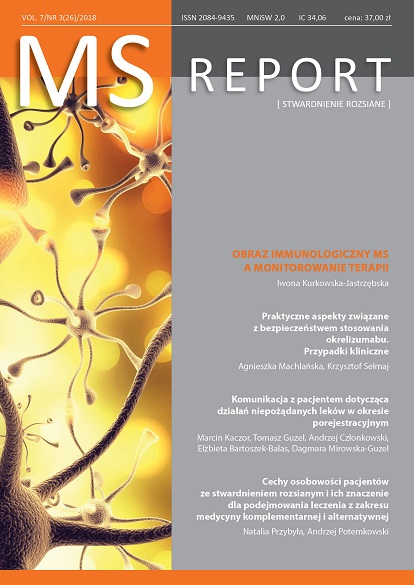Patient-oriented post-registration communication on adverse drug reactions Review article
Main Article Content
Abstract
Adverse drug reactions are big challenge for modern medicine. One of the appropriate part of doctor–patient relation is informing about adverse drug reactions. Knowledge, the same as the way of informing, is crucial to ensure patient’s safety. It includes diminishing patient’s fear of using the drug but on the other hand accepting cessation of pharmacotherapy in case of unacceptable risk. Nowadays, patients might be involved in pharmacovigilance system, as they might report suspicion on adverse drug reactions. Sometimes they even contact with the stakeholder to provide data on drug safety. In the article the main aspects of doctor–patients and patient–stakeholder communication on adverse drug reactions were presented.
Article Details
Copyright © by Medical Education. All rights reserved.
References
2. Ustawa z dnia 6 września 2001 r. Prawo farmaceutyczne. Dz.U. z 2008 r. nr 45, poz. 271, z późniejszymi zmianami.
3. Bouvy J.C., De Bruin M.L., Koopmanschap M.A.: Epidemiology of adverse drug reactions in Europe: a review of recent observational studies. Drug Safety 2015; 38: 437-453.
4. Lazarou J., Pomeranz B.H., Corey P.N.: Incidence of adverse drug reactions in hospitalized patients: a meta-analysis of prospective studies. JAMA 1998; 279: 1200-1205.
5. Arcab A., Lepionka W., Miernecka D., Pomorski I.: Jak powstaje bezpieczny lek. Od badań klinicznych do pacjenta. W: Maciejczyk A., Kruk M. (red.): Bezpieczeństwo farmakoterapii. Medipage, Warszawa 2017: 37-59.
6. Hugman B.: The Erice Declaration. Drug Safety 2006; 29: 91-93.
7. Edwards I.R.: A new Erice Report considering the safety of medicines in the 21st century. Drug Safety 2017; 40: 845-849.
8. Edwards I.R., Hugman B., Lindquist M., Velo G.P.: Erice Statement 2009: communication, medicine and patient safety. Br. J. Clin. Pharmacol. 2010; 69: 207-208.
9. Sass-Stańczak K., Czabała J.C.: Relacja terapeutyczna – co na nią wpływa i jak ona wpływa na proces psychoterapii. Psychoterapia 2015; 1(172): 5-17.
10. Makara-Studzińska M.: Komunikacja z pacjentem. Czelej, Lublin 2012.
11. Rae-Grant A., Day G.S., Marrie R.A. et al.: Podsumowanie praktycznych zaleceń dotyczących leczenia modyfikującego przebieg stwardnienia rozsianego u dorosłych. Raport Guideline Development, Dissemination and Implementation Subcommittee of the American Academy of Neurology. Medycyna Praktyczna, Neurologia 2018; 5: 25-43.
12. Mirowska-Guzel D.: Komentarz do artykułu: Podsumowanie praktycznych zaleceń dotyczących leczenia modyfikującego przebieg stwardnienia rozsianego u dorosłych, Raport Guideline Development, Dissemination and Implementation Subcommittee of the American Academy of Neurology. Medycyna Praktyczna, Neurologia 2018; 5: 43-44.
13. EMA. List of medicines under additional monitoring
[online].

